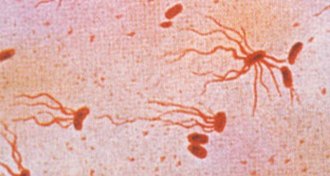All Stories
-
 Genetics
GeneticsSome people are resistant to genetic disease
People who should have genetic diseases but don’t may point to new treatments.
-
 Earth
EarthMost diamonds share a common origin story
Most diamonds form from fluids deep inside Earth’s interior that contain carbonate compounds, new research suggests.
-
 Health & Medicine
Health & MedicineThis week in Zika: New mouse model, virus vs. placenta, nerve insulation loss
In three new papers, scientists present a tool for studying Zika, strike down a theory of infection and offer a broad look at what the virus does to the brain.
By Meghan Rosen -
 Genetics
GeneticsResearchers edit genes in human embryos for second time
Researchers in China deploy CRISPR to alter genes in human embryos again — this time to make cells HIV-resistant.
-
 Health & Medicine
Health & MedicineA sugar can melt away cholesterol
A sugar called cyclodextrin removes cholesterol from hardened arteries in mouse studies.
-
 Physics
PhysicsTurning water to steam, no boiling required
A new material can convert water into steam with sunlight alone, and could be useful for making fresh water from salty.
-
 Climate
ClimateScience’s inconvenient (but interesting) uncertainties
In the latest issue of Science News, Editor in Chief Eva Emerson talks climate change, mouth microbes, and synthetic life.
By Eva Emerson -
 Climate
ClimateChanging climate: 10 years after ‘An Inconvenient Truth’
In the 10 years since "An Inconvenient Truth," climate researchers have made progress in predicting how rising temperatures will affect sea level, weather patterns and polar ice.
-
 Oceans
OceansReaders question ocean health
Ocean plastics, ant behavior, pollution solutions and more in reader feedback.
-
 Animals
AnimalsA sperm whale’s head is built for ramming
Computer simulations of a sperm whale’s head show that an organ called the junk may help protect the brain when ramming other whales — or ships.
-
 Animals
AnimalsPiggybacking tadpoles are epic food beggars
Tadpoles beg so frantically among mimic poison frogs that researchers check to see whether they’re just scamming.
By Susan Milius -
 Life
LifeTyphoid toxin aids survival in mice
A DNA-damaging bacterial protein may prolong the lives of infected animals.